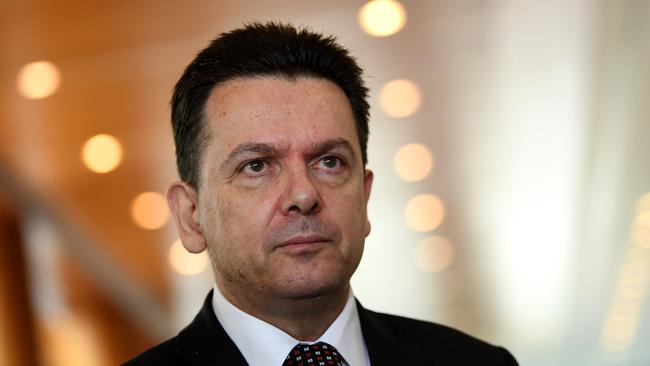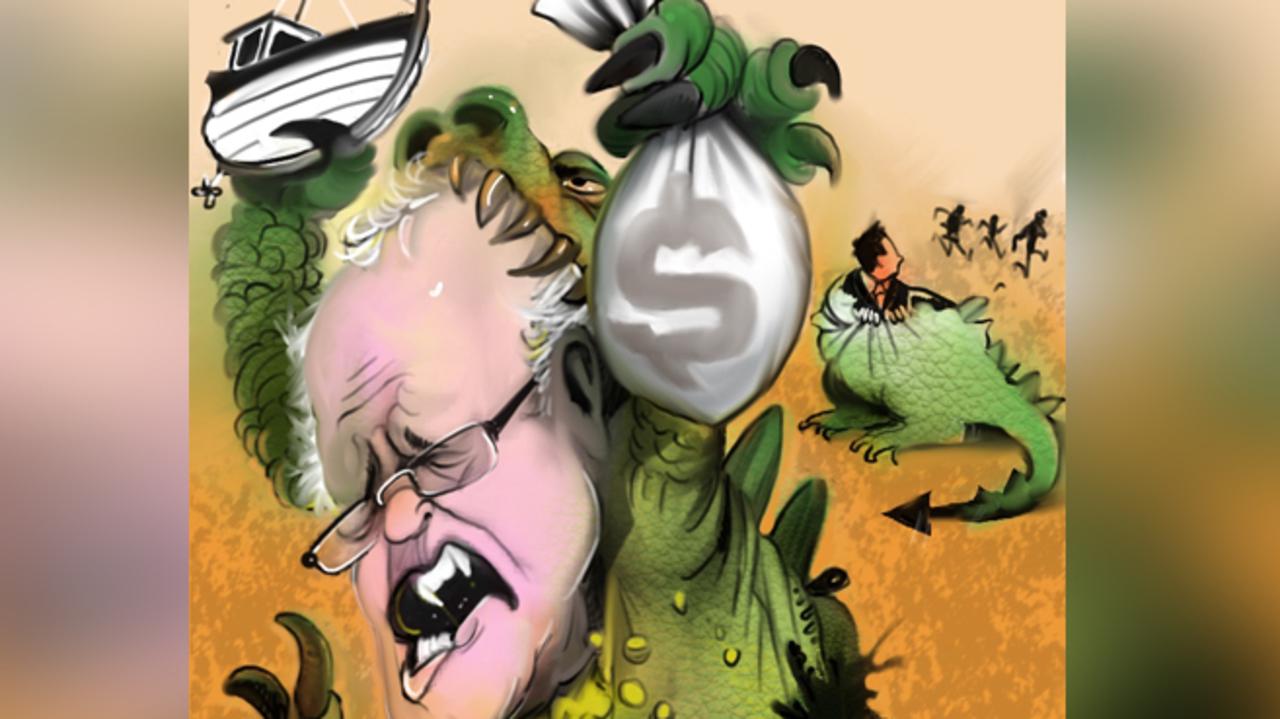Tough negotiations left mark on Xenophon

Anyone observing Nick Xenophon finally declare his support for the media reform package last month could be forgiven for thinking he was a spent force. He looked and sounded like a broken man, ready to quit. Then he did.
Drawn and pale, Xenophon described negotiations on the package as “the most difficult and protracted and robust set of negotiations I have engaged with in 20 years of being in parliament, state and federal”.
He wasn’t kidding. There were times the strain was so great his distress was painfully evident to those around him. He had made promises to people he couldn’t keep and felt keenly he had let them down.
Communications Minister Mitch Fifield agreed to some of Xenophon’s demands, principally to help regional players, but drew the line at money for other players and paying journalists’ wages.
Fifield was emphatic: that was the deal or there would be no deal. After spending months stitching together the support of every media outlet in the country, he was prepared to walk away from the package rather than risk it unravelling because of Xenophon’s demands.
No wonder Xenophon said last weekend that behind the genial facade Fifield was one hell of a tough negotiator.
Other negotiations with other ministers also had been hard, particularly with Mathias Cormann on tax, which were hindered by the death of Xenophon’s uncle. Xenophon was not the critical vote on every issue but he was on many of them, each one seemingly tougher than the last, putting immense pressure on the senator.
His disillusionment was later compounded by suspicions Labor was behind the leaks over his citizenship, which resulted in his referral to the High Court and delayed his resignation, although when it came it was with a twist.
He has withdrawn to regroup in South Australia, where he has hopes of becoming kingmaker, while remaining dealmaker-in-chief in Canberra. Stranger things have happened in politics, but it takes a special kind of politician, perhaps one of Greek-Cypriot-British-Australian heritage, to embark on something like this.
Neither the numbers nor the composition of the upper house will be changed by Xenophon’s decision, or (unlike in the lower house) by any ruling from the High Court on his status or that of the other senators under question.
While Turnbull government ministers express regret at Xenophon’s departure (he was a known, if at times mercurial, quantity) they are sanguine about life without him.
They hope for a calmer relationship with Stirling Griff, who learned about business by selling kerosene door to door as a kid, whom they assume will take over.
The question then will be how much influence Xenophon has over future negotiations and if the remaining federal Nick Xenophon Team MPs can stick together.
Given the number of issues the government confronts, it would be wrong to say this is the least of its worries. It is merely one of many.
The least of its worries, internally at least, is Tony Abbott, particularly after Abbott said — in yet another reversal like the whirligig self-described weather vane that he is — that climate change was not real but even if it were it could be beneficial because colder weather killed more people than warmer weather.
Weather extremes kill people, but for a former leader (who pretended to believe in climate change when it suited) to say something so crudely provocative was bound to distract from whatever serious point he was making, showing again the poor judgment that characterised his prime ministership and his office. Hello, Sir Prince Philip.
As one senior member of the government said, it showed he was a hypocrite or barking mad. It was an attention-seeking intervention on a par with that of one of his few mates, Craig Kelly, who predicted a few months ago that renewables would kill people this winter.
Abbott’s regular emissions (using defence powers to take over gas reserves, keeping the Hazelwood coal-fired power plant going, threatening to cross the floor if there is a clean energy target or disowning the Paris Agreement on emissions reductions that he forged) get a big bang in the media, but they fall like whimpers in the partyroom. It would help if he used his own powers over shock jocks to get them to stop making ads against coal mining or running campaigns against fracking. Then again, he is not out there to help.
The government insists it is not a case of a clean energy target or nothing, as it claims Abbott suggests, but between the CET and something — that something to be revealed when parliament resumes. Whatever it is, given he has covered every imaginable option, Abbott will try to claim credit for it.
Entertaining as all this is, back to the Senate, where the next election will bring changes in personnel and numbers.
With only six senators to be elected from each state next time, the quota required for election will almost double from 7.69 per cent to 14.29 per cent. Based on last year’s results, campaign experts calculated that it would be mathematically impossible for Liberal Democrats senator David Leyonhjelm to be re-elected in NSW.
Leyonhjelm finished 12th out of 12 with a primary vote of just 3 per cent and a quota of 0.4 per cent, which makes his recruitment of former Labor leader Mark Latham, now one of the darlings of the hard right of the Liberal Party, an interesting political ploy.
Latham has kept his options open about another stab at a political career, but if he ran for the Senate he certainly would lift the profile of the Liberal Democrats, making it a more unpredictable, if colourful, contest.
Victoria’s Derryn Hinch and South Australia’s Lucy Gichuhi also are likely to lose their seats. Hanson’s One Nation Senate representation could be halved. Based on the last Senate results, she could lose her NSW and West Australian senators, reducing her Senate numbers from four to two.
Meanwhile, Tasmania’s Jacqui Lambie, who is not up for re-election, is unlikely to see a partner elected on her ticket.
Before Xenophon resigned, experts reckoned the NXT stood to win two Senate spots in SA, increasing its Senate team from three to four, possibly at the expense of the Australian Greens’ Sarah Hanson-Young, although her demise regularly is predicted.
No one can say with confidence who will pick up the lost seats.
Unless other high-profile independents emerge with large followings, and unless the major parties are even more on the nose than they are now, most of those seats should go to the Coalition or Labor.



To join the conversation, please log in. Don't have an account? Register
Join the conversation, you are commenting as Logout